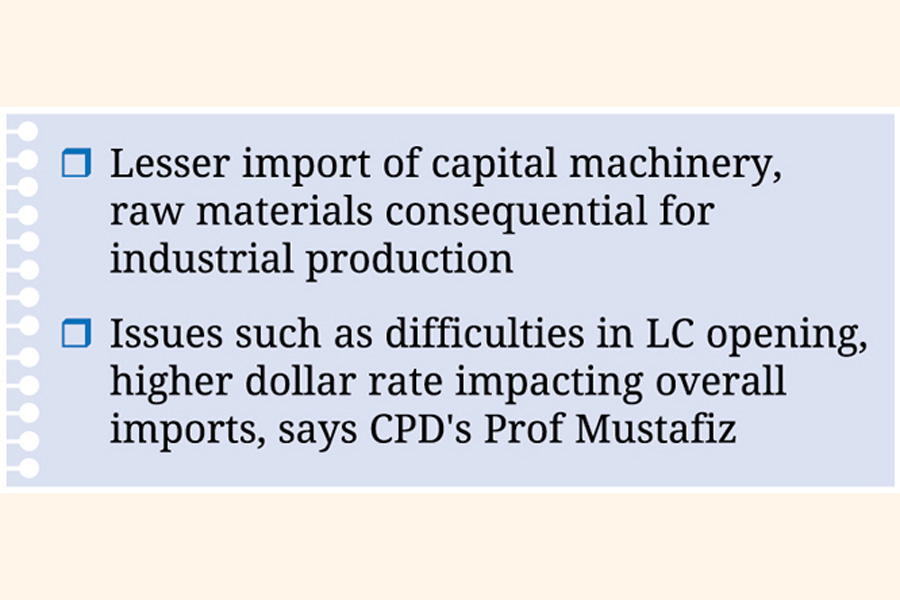Import payments fall with domino effect on economy
July-Mar spending squeezes 16pc as govt austerity stance prolongs amid forex crunch

Published :
Updated :

Bangladesh's import payments have plummeted amid tight-fisted spending from scarce foreign- exchange reserves, with a notable fall in capital machinery-and raw-material imports by industrial enterprises, according to latest available data.
Customs-based imports decreased 15.54 per cent during July-March of the current financial year compared to a 12.37-percent fall during July-March of FY23, according to Bangladesh Bank (BB) data.
On the other hand, the country's overall import payments fell 16.03 per cent in March 2024 year on year.
Meanwhile, the opening and settlement of import LCs decreased 4.23 per cent and 13.93 per cent respectively during July-February of FY24.
A notable depreciation of the Bangladesh taka against the US dollar and import monitoring by the central bank amid monetary crunch might have contributed to the negative growth of imports, according to the central bank's analysis.
According to sources familiar with the situation, the tight-fisting has been affecting many local manufacturing sectors, particularly those that rely on imported raw materials, with a cascading effect on the economy and market prices.
The country's overall customs-cleared import payments stood over US$ 49.21 billion in July-March this fiscal year while it had reached over US$58.27 billion a year back, according to the BB data.
Such import payments amounted to US$ 5.10 billion in March this fiscal year in a fall from US$ 6.08 billion in March last fiscal year, the central bank data showed.
Of the total, the import cost of intermediate goods, which are directly related to investment and production, declined 14.2 per cent during the nine months of this fiscal.
Total intermediate goods imported during the period under review cost US$ 29.66 billion, down from US$ 34.55 billion.
Imports of capital goods which are also directly related to investment and production fell by 22.5 per cent in July-march in FY 24.
The capital-machinery import dropped 23.7 per cent during the period.
Total capital-goods imports were worth US$ 8.06 billion in July-March this fiscal year.
Food-grain imports also declined 34 per cent whereas consumer goods fell by 18.5 per cent, the BB data showed.
Imports for export-oriented garment sector declined 9.1 per cent July-March FY24.
Distinguished fellow of the Centre for Policy Dialogue Prof Mustafizur Rahman feels that the government should put emphasis on attracting more foreign direct investment (FDI), which is seen as a means of repletion of the forex reserves and also raising imports.
"We are not seeing any visible steps to diversify export products, which should be a priority," says the CPD economist.
Professor Rahman also notes that the unit prices for some products on the global market have declined, potentially affecting import value on a limited scale.
However, he points out that new investments in the country are not coming as expected.
"Bangladesh faces several macroeconomic challenges which may affect the overall import," Professor Mustafiz states.
Besides, issues such as difficulties in opening letter of credit (LC) and a higher dollar rate are impacting overall imports.
sajibur@gmail.com


 For all latest news, follow The Financial Express Google News channel.
For all latest news, follow The Financial Express Google News channel.